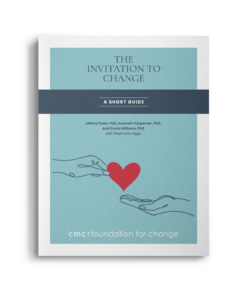FAQ
Yes, CMC:Foundation for Change is a 501(c)3 charitable organization. All donations are tax exempt. Please contact your tax advisor before making a gift to confirm the details of your exemption. Click here to donate.
We accept donations via credit card, check, wire and stock. To donate online click here! Checks can be made payable to CMC:Foundation for Change, 519 8th Avenue, 9th Floor, New York NY. Please include your full name and mailing address and contact information so we can send you a receipt. For information about wire transfers or donating stock please contact Meg Murray at 212-683-3684 ext 180, or by email at [email protected]
Yes. If you would like to make a donation in honor or memory of someone follow the prompts on our online form.
Not yet! We are currently building out our volunteer program and hope to have opportunities soon. If you are interested in running an ITC Community Support Group, click here for more information!
CMC:Foundation for Change does not have a formal internship program. However, we are always looking for smart, motivated interns to join our team for a semester or summer. Interested in interning with us? Email [email protected] for more information.
CMC:Foundation for Change does not provide treatment. Through workshops, support groups, digital content and written resources we work to change the conversation around substance use and reduce shame and stigma when accessing treatment. The dissemination of knowledge is a central component of our work: we train both families and treatment professionals in methods to help people change that can be used by and shared between anyone. If you are specifically looking for information regarding treatment or treatment referrals see our guide to navigating the treatment system. Please note we do not provide referrals to specific programs or clinicians.
At this time, our in-house trainers are clinicians who have had years of exposure to the ITC and have been invited by our organization to become trainers. This year we are building out our Train the Trainer program. Stay tuned for more information on how we will roll that out! Alternative to becoming an in-house FFC trainer, you take a 16-hour workshop with us and then pursue Level 1 ITC Certification, which will give you the opportunity to start an ITC support group, helping families learn and use the ITC with their loved one. Visit our ITC Certification page for more information.
The Invitation to Change Approach shares many principles and practices in common with CRAFT, such as using positive reinforcement to support change in your loved one. In many ways, ITC evolved out of CRAFT. However, ITC also draws from the research supporting Motivational Interviewing, a therapy technique that uses specific communication styles to support motivation for behavior change, and from that supporting Acceptance and Commitment Therapy (ACT), which emphasizes mindfulness in order to help people make peace with difficult emotions.
The Invitation to Change Approach not only blends important evidence-backed ideas and strategies from these three models, but also offers a distinct framework—based in “science and kindness”—that uses clear, accessible, and actionable language to describe the approach, offers unique and helpful learning exercises, and acknowledges the many parts of the helping process and their challenges. We have received feedback that, compared to CRAFT training, “several people that attended your 2-3 day workshop…took what they learned and [were] able to implement your [ITC] model, protocols right away.”
A huge number of professionals who take our training have also taken CRAFT training. We get very positive feedback from both families and professionals who take Invitation to Change workshops, and firmly believe it is useful to take one even if you are familiar with CRAFT. We believe that both the experience of it and the knowledge gained will differ, and be valuable.
We have worked with a number of recovery professionals and organizations to develop new programs, often with the Invitation to Change Approach at the center. Please use our contact page to get in touch and see if we might be able to advise you and/or collaborate.
Please note we do not provide referrals to specific programs or clinicians. Each person and situation is unique. In lieu of referring to specific treatment providers, see our guide to navigating the treatment system in general.
